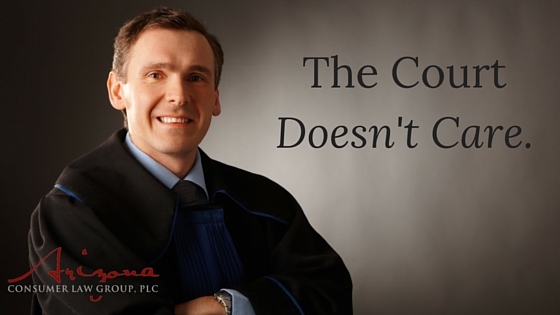Did you have to stop paying your bills because you lost your job, got sick, go divorced? The court doesn’t care. Are you in debt because your business that you worked night and day at failed? The court simply does not care.
It’s not that courts are made up of heartless judges who don’t understand the struggles of life – in fact, of all people, judges have a front row seat to almost every imaginable difficulty that can be experienced by a human.
Yet many people who are experiencing debt problems, and in particular those who are dealing with a debt collection lawsuit, believe that the courts don’t listen and in the end doesn’t care why they are in the tough financial position they are in.
And if this has been your experience, in part, you are correct. The court will listen, but in general it really doesn’t care how it is you got in the difficult position you find yourself.
And that is because the court’s role in your debt collection lawsuit is to determine, after listening to both sides of the story, whether or not you actually owe the debt.
Why you weren’t able to repay the debt is mostly irrelevant.
And that is frustrating – particularly to those who have made a good faith attempt to pay their debts, or at least settle with their creditors, but the creditors won’t budge.
But that plays almost no role in the determination of whether or not you are contractually obligated to pay a debt and if so how much is actually owed. That is the court’s role. The judge in your case is tasked with weighing the evidence presented by the debt collector, considering your defenses, and deciding whether or not the debt collectors has proven that you owe them money.
So when you go before the court and tell the judge that you “tried to make minimum monthly payments but the debt collector wouldn’t accept them” you aren’t presenting a defense as to why you don’t owe the debt and – in fact you are doing just the opposite – you are helping the debt collector prove its case by admitting to owing on the debt.
Being involved in a debt collection lawsuit can be very frustrating. But you can reduce some of the frustration (and improve your chances of winning your case) by understanding that the judge’s role is to determine liability, and if liability is proven then the judge must determine how much is owed.
And that is really it.
You may have the most compassionate judge on the planet, but in the end she probably doesn’t care.
Schedule a Free Consultation!
 John Skiba, Esq.
John Skiba, Esq.
We offer a free consultation to discuss your debt problem and help you put together a game plan to eliminate your debt once and for all. Give us a call at (480) 420-4028

